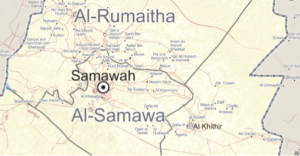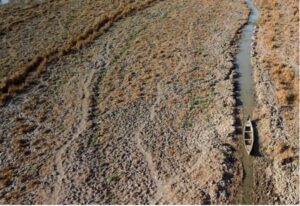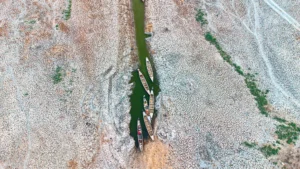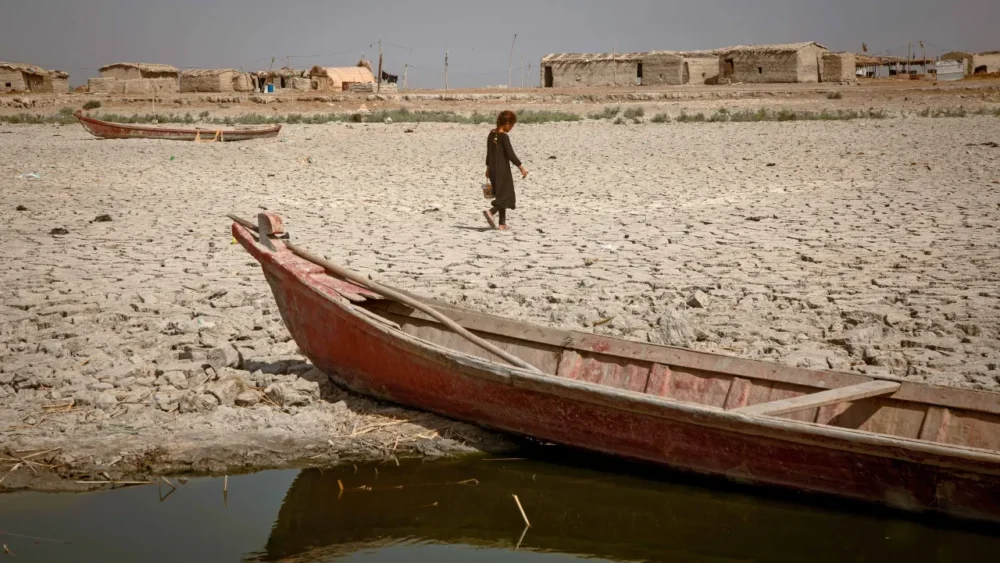By Adilah Shaheen
This article originally appeared in Raseef22
“I Lost My Baby Because the Land is Too Salty”: Iraqi Women Suffer from Climate Change in the South.
In the heat of southern Iraq, Qisma, a 14-year-old girl from As-Suwayr (aka Al-Zeirijiyah), 12 kilometers east of Samawah city in Muthana Province, collapsed from exhaustion while making her daily three-mile trek to fetch water from a distant well. Her mother recounts how Qisma, like many other girls in their community, is forced to undertake this daily journey under the scorching sun due to the severe drought that has hit their region.
“My husband pulled our daughter out of school to help with household chores and care for her younger siblings. He married her off to an elderly man to relieve himself of the burden of providing for her,”
Qisma’s mother explains. She adds that the harsh climate conditions — including a lack of rain and soaring summer temperatures in recent years — have turned the once fertile lands of As-Suwayrinto “Ka’a Subkha” — barren, salty soil that is unfit for agriculture.

I Lost My Child Because of the Salty Soil
Naba’ (a pseudonym), 23, from As-Suwayr, almost died after suffering a miscarriage due to a lack of potable water. “I lost my child because of the salty soil,” she says, her voice trembling. In her village, most of the water is filtered using primitive methods like cloth straining, which doesn’t remove all the salt, leading to complications such as high blood pressure during pregnancy.
Iraq is among the five countries most vulnerable to climate change and desertification, despite the presence of the Tigris and Euphrates rivers. The severe lack of rainfall in recent years, combined with other climate factors, has halved the area of arable land. The World Bank warned in November 2022 that Iraq could suffer a 20% drop in available drinking water resources by 2050 due to climate change.
According to a report by Iraq’s state-run Al-Sabah newspaper, Al-Muthanna Province, located on the Euphrates River, is one of Iraq’s poorest regions and suffers from severe water shortages. The province, home to about a million people, most of whom are farmers and cattle breeders, has faced water scarcity for over two decades. Many residents have no choice but to endure the effects of climate change or migrate to other parts of Iraq.

Mobilizing Aid Amidst Crisis
Amid the twin crises of drought and desertification, Maryam Al-Fartousi, Executive Director of the Alice Foundation for Women’s and Children’s Rights, has collaborated with the Iraqi Red Crescent Society to establish a mobile clinic in As-Suwayr, staffed with medical professionals and stocked with essential medicines and supplies.
“The harsh climate conditions are pushing families to marry off their daughters early,”
Al-Fartousi tells Raseef22.
“When a family’s living conditions deteriorate, parents often try to ‘get rid of their daughters’ at a young age to escape the burden of providing for them.”
She adds that:
“early marriage and pregnancy have devastating effects on women’s health and can lead to severe human rights violations.”
The Grueling Search for Water
The severe drought has significantly affected the lives of women, who are often tasked with the burden of finding water in difficult conditions. Most women spend long hours fetching drinking water, walking to and from water trucks or wells, and waiting in line for their turn, adding to the physical effort required.
Umm Ali, a 43-year-old mother of four from As-Suwayr, tells Raseef22,
“The only way to get drinking water is by digging wells or relying on water trucks that move around the village. However, since most of our houses are built from mud and are at risk of collapsing, villagers are reluctant to let these trucks get too close. As a result, the trucks stop far from the village, and women are forced to make multiple trips, carrying heavy loads of water, even while pregnant or suffering from joint and neck pain.”
A Call for Inclusive Change
At the core of real change lies the principle of freeing people from traditional mindsets by involving everyone in the process. This is the mission of Raseef22, which champions the values of respect, tolerance, freedom, and openness to improve people’s lives.
The Alice Foundation reports that climate change has severely impacted rural women, leading to deteriorating agriculture and food security due to droughts and floods, as well as increased burdens of water collection due to scarcity. These changes have also heightened the spread of diseases and worsened health conditions, placing a significant strain on women’s overall well-being. Additionally, the harsh climate conditions force women to migrate, exposing them to economic and social risks, as their limited economic and social empowerment reduces their ability to adapt to these changes and participate in decision-making.
Climate Change Threatens Basic Human Rights in Iraq
Environmental expert Laith Al-Obeidi describes the drought that has hit Iraq’s southern provinces as a “disaster.” He explains,
“The effects of climate change in the southern provinces have directly impacted agriculture due to factors such as desertification, sand dune encroachment, and the spread of agricultural pests due to the lack of surface water. This has led to the loss of food security and livelihoods, prompting some residents in Al-Samawah in Al-Muthanna Province to rely on wells. In other areas, like Al-Diwaniyah in southern Iraq, this has not worked, as the wells are highly saline.”
Al-Obeidi adds,
“Climate change has affected the economic and social fabric of the marshlands, which have witnessed large-scale migrations to provinces like Najaf, Karbala, Babil, and Basra due to the dwindling resources they rely on, such as buffalo breeding and fishing. Moreover, climate-induced pressures, such as competition over natural resources and water sources, have led to conflicts and increased violence.”
Naba’ recounts her experience: “I had to take on the responsibility of providing for my family alone after my husband moved to the city to find work because the land we lived on had dried up. I had to find any means to provide water, bread, and food for my three children. Hunger, lack of food, salty drinking water, and exhaustion from high temperatures all contributed to my miscarriage.”
Health Risks for Women
Obstetrician Dr. Safa Dawood Suleiman highlights the negative effects of climate change and rising temperatures on women’s health, particularly in dry areas where people are forced to drink saline water. she tells Raseef22.
“Drinking salty water leads to fluid retention in pregnant women and preeclampsia because the body cannot eliminate the salt. Other dangerous symptoms include sudden high blood pressure and kidney inflammation, increasing the risk of premature birth and miscarriage,”
Suleiman adds,
“Exposure to heat stress and malnutrition in pregnant women can lead to low birth weight or anemia, negatively affecting the fetus that receives nutrients through the umbilical cord, endangering both mother and child.”
Volunteer Noor Mohammed, part of the Alice Foundation’s mobile clinic initiative, says,
“The mobile clinic has saved many women from miscarriages because water shortages are a major problem in the area, putting additional pressure on women, especially pregnant ones, and there are no hospitals or specialized clinics nearby.”
The Fight for Basic Needs
A report from Women Deliver, an American organization focused on women’s health and reproductive rights, highlights the severe impacts of climate change on sexual and reproductive health. Extreme weather events such as heatwaves, droughts, and floods increase women’s and girls’ exposure to health risks and limit their access to essential services.
“The drought crisis has affected even the provision of sanitary pads to women due to the poverty that hit As-Suwayr after the crops died and many shops closed,”
says Al-Fartousi.
“We have taken the initiative to provide sanitary pads and promote personal hygiene because the expected continuation of climate change and its impact on reproductive health necessitates immediate action.”
Dr. Suleiman notes that recurring climate changes, such as rising temperatures and droughts, can cause menstrual disorders.
“Heat stress is one of the factors behind irregular periods. Most women in areas exposed to high temperatures suffer from heavy bleeding during menstruation, egg damage, and reduced fertility.”

The Harsh Reality of Migration
Sarah (a pseudonym), 32, arrived in the Zubair district of southern Iraq with her husband and two small children after being forced to leave her home in “Hor Um Al-Wada,” south of Nasiriyah. Her village faced a severe drought during the summer, causing the residents to leave one by one in search of livelihoods after losing their work in fishing and livestock rearing.
“I went into labor in my seventh month of pregnancy and rushed to the midwife near my home in Um Al-Wada,”
she says.
“Within hours, we and hundreds of other villagers had to leave the area, which had become devoid of life, water, food, and sources of income.”
Sarah’s child, born prematurely, survived only two days.
The United Nations Environment Program reports that Iraqis suffer from severe human rights violations due to environmental degradation caused by conflicts, the oil industry, and government mismanagement. The latest International Organization for Migration reports reveal that over 140,000 Iraqis from 23,000 families have been forced to flee their homes in central and southern Iraq due to drought and desertification.
Research also shows a direct link between a one-degree Celsius rise in temperature during the week preceding birth and a 6% increase in the risk of stillbirth, particularly during summer months.
Al-Fartousi emphasizes the need to view climate change from a human rights perspective to better protect those affected and provide safety nets to shield them from the challenges of migration in an unfamiliar environment. For those unable to migrate, monitoring their reproductive health is crucial to preventing the rise in anxiety and tension.
This article originally appeared on Raseef22 and has been translated and adapted by IC3+ for clarity and journal. Photos by GettyImages & ICRC. Map by UNOCHA Iraq.
![Iraq Climate Change Center [IC3+]](https://iraqclimatechange.org/wp-content/uploads/2024/06/logo2.png)
